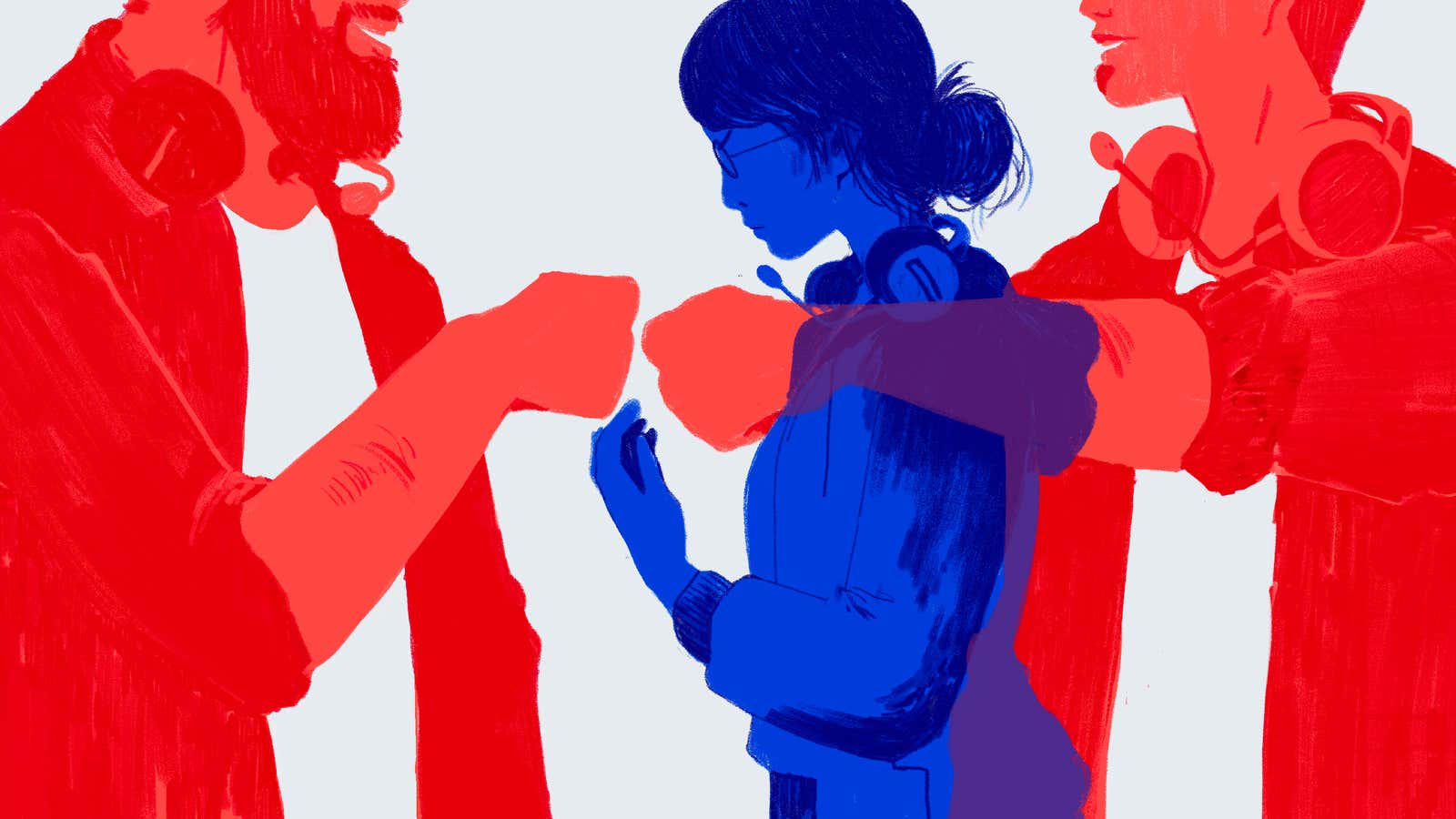Throughout her three years at Riot Games, the company behind League of Legends, Lacy made it her mission to hire a woman into a leadership role. Lacy had heard plenty of excuses for why her female job candidates weren’t Riot material. Some were “ladder climbers.” Others had “too much ego.” Most weren’t “gamer enough.” A few were “too punchy,” or didn’t “challenge convention,” a motto you can find in Riot’s company manifesto and recruiting materials.
“Across the board, you’d have side-by-side similar backgrounds,” said Lacy, which is not her real name, “but the leadership team would constantly ixnay any female candidate for leadership.”
Hiring a woman into a leadership position proved impossible for Lacy, she said, and she left the company in part because of the sexism she’d personally experienced. She said her direct manager would ask her if it was hard working at Riot being so cute. Sometimes, she said, he’d imply that her position was a direct result of her appearance. Every few months, she said, a male boss of hers would comment in public meetings about how her kids and husband must really miss her while she was at work.
One day, Lacy conducted an experiment: After an idea she really believed in fell flat during a meeting, she asked a male colleague to present the same idea to the same group of people days later. He was skeptical, but she insisted that he give it a shot. “Lo and behold, the week after that, [he] went in, presented exactly as I did and the whole room was like, ‘Oh my gosh, this is amazing.’ [His] face turned beet red and he had tears in his eyes,” said Lacy. “They just didn’t respect women.”
Riot Games, founded in 2006, has become one of the biggest companies in gaming on the back of its sole release, League of Legends, which had 100 million monthly players in 2016. With 2,500 employees across 20 offices, Riot is a powerhouse. In 2013, Riot was named one of Business Insider’s 25 best tech companies to work for. Two years later, it made $1.6 billion in revenue. Its Los Angeles campus is cushy in the way you’d expect a money-bloated tech company’s offices to be. It’s got a gym, a coffee shop, a cafeteria with free food, a LAN cafe. Employees often stay late to grind out competitive skill points in League of Legends with their Riot family and are communicating on Slack well into the night. Women who don’t fit in with Riot’s “bro culture”—a term I heard from over a half dozen sources while reporting this story—say these amenities help make the job bearable for only so long.
Over the course of several months, Kotaku has spoken to 28 current and former Riot employees, many of whom came forward with stories that echo Lacy’s. Some of those employees spoke on the record; most spoke anonymously because they feared for their future careers in the games industry or they were concerned that League of Legends’ passionate fanbase would retaliate against them for speaking out. Many of those sources painted a picture of Riot as a place where women are treated unfairly, where the company’s culture puts female employees at a disadvantage. Other current employees, speaking on the record, disputed that account, with some top female employees telling Kotaku they had not personally experienced gender discrimination at Riot.

Five months after we started reporting for this article, days after Riot apparently learned about it, the company added a “diversity and inclusion” page on its website that says, “We aggressively enforce a zero tolerance policy on discrimination, harassment, and general toxicity. It is incredibly important that our leaders embody this commitment, and reinforce this expectation across their teams.” The page was added in late May, according to the Wayback Machine, but when asked, a Riot representative said the company’s “roadmap” for diversity and inclusion initiatives, including a public-facing definition of “gamer,” was presented to Riot staff as early as April, “notably well before Kotaku began its inquiries.” (Kotaku began its inquires in December of last year, and reached out to Riot leadership mid-May.)
The page also says, “There is no cookie cutter template for what a Rioter looks like.” But women who have worked there said that nothing could be further from the truth.
Over the course of reporting this story, we found that many former Riot employees were restricted from talking on the record because of non-disparagement agreements they signed before leaving the company. Some say they received severance after speaking to Riot’s “talent” team—what the company calls its human resources team—about their experiences at the company.
When contacted by Kotaku for comment on the details in this story, Riot sent over a lengthy statement, which we’ve quoted throughout this story. In short, the company said that the anecdotes described in this article are “explicitly opposite” to its culture. “When we encounter any contrary behaviors, we dig in to understand, evaluate, and address,” the company said. “We have a zero tolerance policy on discrimination, harassment, retaliation, bullying, and general toxicity.”
Among the people we spoke to, three women described being groomed for promotions, and doing jobs above their title and pay grade, until men were suddenly brought in to replace them. Both male and female sources have described seeing unsolicited and unwelcome pictures of male genitalia from bosses or colleagues. One woman saw an e-mail thread about what it would be like to “penetrate her,” in which a colleague added that she’d be a good target to sleep with and not call again. Another said a colleague once informed her, apparently as a compliment, that she was on a list getting passed around by senior leaders detailing who they’d sleep with. Two former employees said they felt pressure to leave after making their concerns about gender discrimination known. One former male employee said that Riot’s “bro culture” is more pronounced behind closed doors, and hurts men too: One of Riot’s male senior leaders regularly grabbed his genitals, the source said, adding, “If he walked into a meeting with no women he’d just fart on someone’s face.”
“The ‘bro culture’ there is so real,” said one female source, who said she’d left the company due to sexism. “It’s agonizingly real. It’s like working at a giant fraternity.” Eighty percent of Riot employees are men, according to data Riot collected from employees’ driver’s licenses.
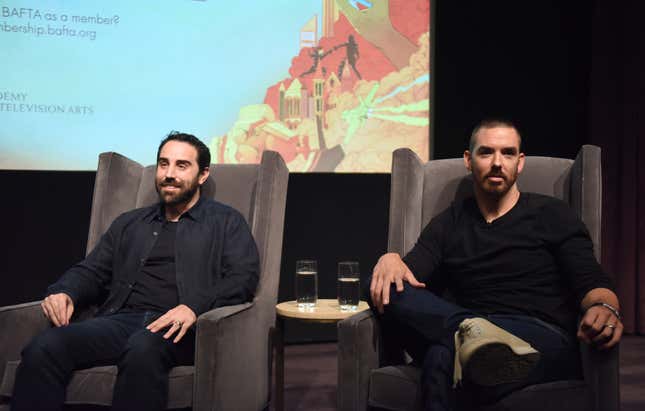
It’s not unusual for a tech or gaming company to struggle with sexism and lack of diversity. In recent years, some studios have tried to reckon with that reality, taking steps to hire more women and making games that showcase more diverse characters. But at Riot, the fundamental values fueling its celebrated culture of “core gamers” and Riot devotees over the past decade may also be the root causes of an ingrained sexism that manifests in both blatant and subtle ways.
Among behemoth tech companies, there’s a commonly-held belief in the idea of meritocracy. That’s the notion that the most talented and deserving employees will rise through the ranks into leadership positions. In theory, it’s a no-brainer goal for any workplace. In reality, it doesn’t seem to materialize at companies like Riot. The problem of hiring, promoting and retaining women at tech companies is well-documented, and it’s a problem that makes any true “meritocracy” difficult to attain at these workplaces. At Silicon Valley-based companies like Google and Apple, only a quarter of “professional” jobs—like engineers, designers and analysts—were held by women in 2016, according to Reveal, a project from The Center for Investigative Reporting. When it comes to leadership positions, that number is much lower. In the technology field, the quit rate for women is over twice as high as it is for men, according to a study by the National Center for Women & Information Technology. One report surveying 3,700 women in engineering detailed how women in these fields felt they had fewer opportunities for advancement and a higher rate of feeling undermined by managers.
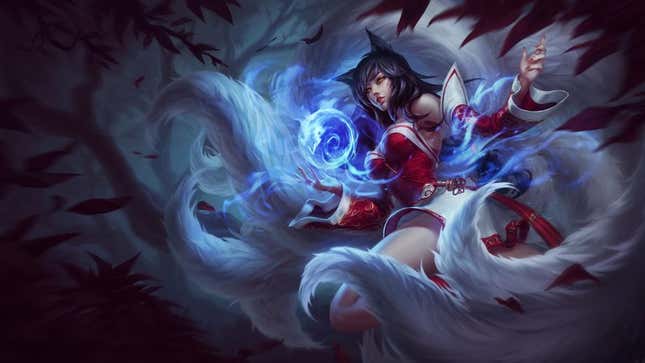
In books like Lean Out, women in tech detail how the cards are stacked against them from the moment they walk through these companies’ glass doors: They don’t fit the image of the ideal employee at a tech company, or were not encouraged to pursue STEM at a young age, and aren’t assessed within the same paradigms set for male employees who played with circuit boards instead of American Girl dolls. That can cultivate a culture at big tech companies in which the “ideal” employee—the time-tried model for someone who easily and confidently advances through a company’s ranks—is a man.
Stories from both men and women who have worked for Riot indicate that the company behind League of Legends also suffers from this trend. When told of these stories, a Riot representative said they detailed “behaviors we would not tolerate and would be quick to squash,” but they point to a common conclusion: Riot’s fundamental values, including its ideal vision of the true Rioter and its culture of meritocracy, have created a workplace that permits and even sometimes rewards sexist behavior.
Gamers First
In her interview at Riot in 2015, one woman was asked to recall her favorite trinket from a 2004 World of Warcraft raid. She had already detailed what games she played and how often she played them. Throughout the hour-long interview, she said, her interviewer had been fact-checking her, looking for holes in the story of her gamer upbringing. “I was trying to prove to this executive that I wasn’t lying about playing games,” she said. To demonstrate she was a real, Riot-style gamer, she recalls wondering in desperation, “Should I just ask this guy to log onto my World of Warcraft profile?” Eventually, she was hired, despite hearing from a confidant later that her interviewer didn’t think she had the “grit” to work there. Another confidant told her that the tone of her interview would have never happened were she a man.
Working at Riot isn’t just about doing a job—it’s about enthusiastically participating in the company’s culture. What that means, among other things, is that successful hires across the company ought to be video game fans and specifically, according to three sources with knowledge of Riot’s recruitment practices, hardcore video game fans. “We want passionate gamers who are talented professionals,” read the first line on Riot’s hiring page until late June. “Loving what you do is mandatory, and you won’t fully appreciate a gamer’s perspective unless you are one. We’re not looking for the feedback averse. You need conviction, passion, and horsepower to excel at Riot.” Those lines are no longer there. Now, the page includes the line, “Whatever you play, if you make time to play, you’re a gamer,” apparently softening Riot’s cultural standards for gaming.
According to four sources with knowledge of Riot’s recruiting practices, this “ideal Rioter” image has led the company to turn down a disproportionate amount of women for jobs.
During hiring, Riot vets whether potential employees will be “culture fits.” According to three sources familiar with Riot’s recruiting practices, Riot focuses on finding what the company calls “core gamers” who can empathize with League players, and especially with the grind for competitive skill points. On paper, that makes sense. People who work at Riot need to understand the product they’re putting out and the community they’re meant to serve. But in practice, four sources say, the company preferencing core gamers when it hires not just game developers, but all of its full-time employees—from office managers to finance specialists—means preferencing a certain kind of person.
Those sources said that talented women have fallen through Riot’s hiring processes because they weren’t considered “core gamers,” which one source described as “an excuse.” Two sources familiar with Riot’s hiring practices say the company checks interviewees’ League of Legends stats prior to bringing them on campus for interviews. In an e-mail, a Riot representative told Kotaku, “During the interview process, we often expect Rioters to try out League of Legends, and for some League development roles require familiarity with the game, but we’re not evaluating for skill.” To correct hiring mistakes, Riot has a program called “queue dodge”; new hires who are deemed cultural “mismatches” can receive 10% of their annual salary, up to $25,000, if they leave.
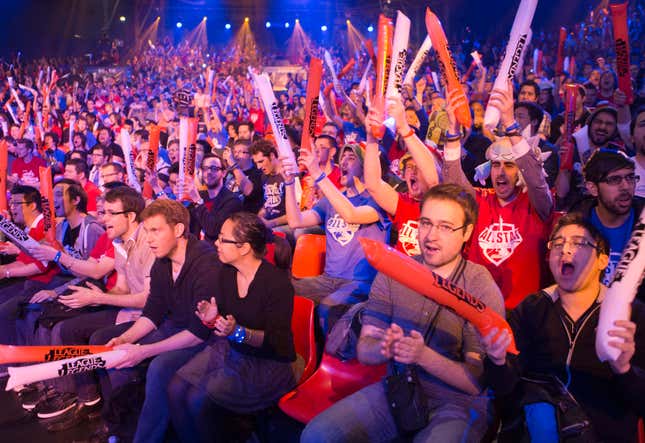
In an interview with Variety published last week, Riot co-founder Marc Merrill explained, “It is drilled into [our employees] that player focus is the thing we aspire to be our north star,” adding, “That’s why we hire gamers and only gamers because the difference between a great decision and a terrible one is how it relates to players.” In a statement sent to Kotaku, Riot said that, “To ensure our aspirational culture becomes a reality and isn’t lost in translation, we must over-index on cultural reinforcement,” adding that “We believe hiring gamers is critical to our success.”
Preferencing Riot’s definition of “core” gamers during hiring means drawing in employees from a larger pool of men than women. Avid players of MOBAs (multiplayer online battle arenas, a genre encompassing popular games including League of Legends and Dota 2) and first-person shooter fans are typically men. Game data company Quantic Foundry surveyed over 270,000 gamers worldwide between July 2015 and January 2017 on what game titles they enjoy playing and reported that only 10% of gamers who play MOBAs are female. For first-person shooters, that number is 7%. Without examining why these gaming genres are heavily male, Riot’s apparent job candidate expectations can create a very stratified workplace, where women, who are less likely to be megafans of these games, are considered lesser Rioters because of the way they grew up. Several women interviewed by Kotaku said that, even after getting hired, they felt they were not taken seriously by colleagues or managers because they weren’t steeped in the competitive online gaming tradition. League of Legends’ playerbase, which in 2012 was over 90 percent male, has earned a reputation for rampant sexist language that Riot has proactively addressed over the last few years. Anecdotal evidence suggests that women who play League of Legends have been regular targets of harassment, and data from Riot indicates that new players encountering toxic behavior are 320 percent less likely to return to the game.
In 2016, Riot surveyed its own employees to study the correlation between in-game and workplace toxicity. It turns out that Rioters who received complaints about their in-game behavior were also awful to work with. According to that study, 25 percent of employees “let go” between 2015 and 2016 had “unusually high in-game toxicity.”
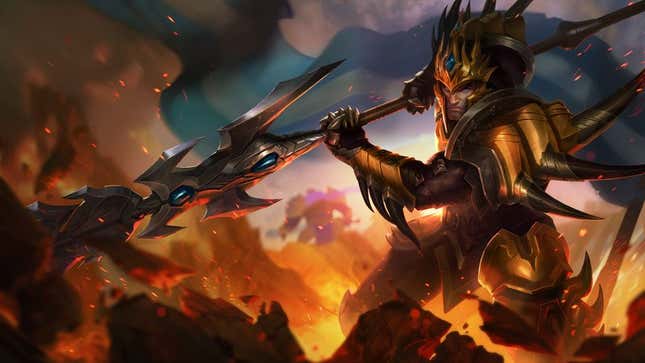
Riot says it doesn’t define “core gamers” as MOBA and first-person shooter players, which several sources with knowledge of Riot’s recruitment practices and who have been interviewed for positions at Riot dispute. One former Riot employee who presented as a woman, for example, has always played role-playing games, and said as much during their 2014 phone interview for a position at Riot not at all adjacent to games development. The interviewer then asked if they played “real games like Call of Duty,” they recalled. “He kept going, kept rephrasing the question, no matter how many times I listed all the things I played,” they said. “In the end, he asked, ‘If someone just met you, how would they know you’re a gamer?’ I said, ‘Well, I’m looking at my TV right now that has 16 game consoles plugged into it.’”
When asked about this trend, Riot acknowledged in its statement that it actively seeks hardcore video game enthusiasts. “We’ve found that the best way to hire Rioters is to hire gamers,” the company said. “While not every Rioter is a gamer, most are. And to be clear, this doesn’t mean just League of Legends; whatever you play, if you make time to play, you’re a gamer. Whether it’s Mario or Dark Souls, MTG or D&D, Overwatch or LoL, a Rioter speaks the language of players and can relate to them in ways that could never be learned on the job. We pride ourselves on player empathy, whether that’s relating to the fun players are having with a new game mode or understanding the pain they’re feeling with a nerf gone too far.”
A former female employee told Kotaku that she was asked “How big is your e-peen?” by an interviewer who was questioning her over her gaming habits. Another former Riot employee, who is passionate about tabletop games, said she was told by an interviewer that her gaming preferences meant she wouldn’t be considered a “gamer” at Riot. Another woman, who was interviewing for a position far removed from games or game development, said she felt like she wasn’t being taken seriously because, instead of playing League of Legends, she casually played World of Warcraft. A few months into her employment, she felt that her suspicions were confirmed at a 2016 global Riot conference talk by a senior producer.
“Here at Riot Games, we hire gamers,” he said in his talk to an audience of Riot employees, audio of which was obtained by Kotaku. “If you’re not a core gamer, you need to over-index in another area.” Whether it’s finance, development facilities, player support, he said, “I don’t give a shit. You’re better if you’re a gamer.” For six minutes, the producer recounted a story of his experience preparing to raid the original World of Warcraft’s Naxxramas dungeon, introduced in 2006. It was 300 hours of raiding into his game, and he detailed the effort, the passion, and the grit it took for him to attain the opportunity. And then, before the raid, his internet died, and he let down his team. The experience gave him an “acid turn” in his stomach, he said, and has become a story he’s kept in his pocket for a decade. “Think of your story,” he demands. “If you don’t have one, get one. I’m serious.”
When asked about this, a Riot representative said: “As we’ve mentioned previously, we believe hiring gamers is critical to our success. The purpose of the 2016 talk was to underscore why hiring gamers is so critical for making the best decisions for players, and that anyone can be a gamer by playing games.”
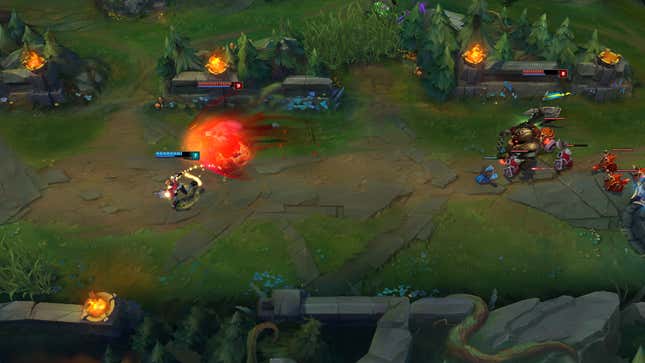
The woman who was asked about her World of Warcraft gear said she felt like an interviewee’s record wasn’t as valued as their ability to fit into Riot’s culture. Even outside of the apparent emphasis on being a “core gamer,” she questioned what interviewers meant when they talked about “culture fit.”
“There are all these generic terms used to find things wrong with women that aren’t specific,” she said. “When I hear ‘She’s emotional,’ I’d say, ‘Okay, why do you think she was being emotional?’ ‘Well she seemed to get intense and was pushing back on this thing.’ The other candidate did that and you liked that because you thought he had ‘grit.’ Why is that different? Is it because this person is a different gender?”
She added, “I hear people comparing two candidates of different genders, and both the candidates can be of the same caliber, and interview the same way, but be described differently.”
A 2015 e-mail about the hiring disparity written by a female employee and sent to Kotaku reads, “I’ve heard women described as ‘aggressive’ and ‘too ambitious’ during hiring panels rather than focus on their career skills or aptitude. I recall a lot of phrases that have given me pause, and I’ve NEVER seen these sorts of phrases applied to male hires: ‘She interrupted me a lot during the phone interview,’ ‘she’s annoying,”’ or ‘we don’t want people in this role who are ambitious because they’ll want to move out of it quickly.’” The e-mailer added that the problem gets deeper when “our hiring panels are, just by the sheer result of the ratio of men to women at Riot, mostly straight/white/male.”
Riot’s co-founder, Marc Merrill, responded by suggesting that the emailer should have reacted by confronting her colleagues on those hiring panels: “What did the Rioters say when you pointed out how strange that feedback was to them?”
Three Rioters I asked about this e-mail said it felt like Merrill was focusing on the wrong thing—whether women who had experienced or witnessed this alleged hiring bias had provided feedback—rather than the inherent sexism in the interview panels themselves. One woman, who left Riot in 2016, said, “It seemed like he assumed she would respond, ‘Oh, I didn’t say anything,’ and then he could blame her for that.” When I read that e-mail to one current Rioter, he interpreted it as such: “It’s putting the blame on people who don’t confront the sexist behavior for the continuation of the sexist behavior. . . the ethical duty should lie with the organization and not with the marginalized people to solve that problem.”
In an e-mail, a Riot representative said, “We absolutely hold people accountable to bad behavior, but if we don’t know about issues, we can’t address them, so we do rely on Rioters to be brave enough to call out that behavior either directly or through other channels.”
Diversity and inclusion initiatives at Riot are led by a woman named Soha El-Sabaawi. She’s been at Riot for over two and a half years, and previously worked at a nonprofit that helped women make games. Her job, she told Kotaku in a phone interview earlier this year, is to help Riot think about diversity and inclusion “holistically and thoughtfully.” When I asked why Riot hired her, she said, “The world around us is changing. With a lot of women feeling less faith in the video games industry overall, the more we were like, ‘We need an outlet for minorities and a representative of minorities to make sure every decision worth making is doing right by everyone.” Before El-Sabaawi was in charge, Riot ran “Definitely Not Sexual Harassment Training,” a glib, League of Legends-themed take on California’s mandatory supervisor training, which several sources Kotaku interviewed thought was dismissive. (There was a mode called “Definitely Not Dominion,” which was a riff on Riot’s “Dominion” mode.)

El-Sabaawi oversees a small committee of Rioters who focus some of their efforts on diversity. They do bias training. They evaluate their job candidate recruiting sources. They’re partnering with diversity-minded nonprofits. When I first asked her what the balance of men to women is at Riot as a whole, and whether that’s changed during her tenure, she said, “We’re working on getting better data.” Two months later, after sources gave Kotaku data about Riot employees’ gender makeup—80 percent male—I asked El-Sabaawi whether these stats have changed over the last few years. She said, “We’re working on getting better data for last year, this year and moving forward. We’ve always been around 20 percent. It hasn’t gone up or down significantly,” but added that Riot doesn’t have “reliable” data from before then. Riot does not have quotas for hiring women in leadership positions, but they do ask for generally diverse candidate pools, she said.
El-Sabaawi is also helping run mandatory interviewer training, she said. “When you are interviewing someone, if they are very similar to you or different from you, here are the kinds of biases you can experience without even realizing it,” she said. “Maybe they say one thing you really like so you like everything else they say. We explicitly talk about, ‘How this is especially true when it comes to demographics?’ When someone is visually different from you, your brain can trick you to think different things about them based on stereotypes or biases that might just unconsciously appear.” El-Sabaawi says that Riot leadership is also trying to pivot on what they mean when they say “core gamer.” She says she wants to make sure “there’s no PC Master Race bullshit happening here,” referencing the tribalistic term that many hardcore PC gamers have used in order to establish elitism over other types of video game fans. In the 2016 internal talk by a Riot producer, that producer made loud proclamations about the “PC Master Race” to enthusiastic applause.
Kimberly Voll, a senior technical designer at Riot who has a PhD in computer science and has worked in gaming for 20 years, told me that Riot “didn’t need to” ask whether she was a hardcore gamer. “I’m a hardcore gamer. I’ve been playing games since the 70s,” she said. Voll, who has sat on a lot of panels interviewing potential employees, says she’s never encountered what looks like hyper-targeted questioning toward female candidates, but still says she’s working to improve the interviewing process generally. “That would make me really sad if that were the case,” she said when I described some of the interview scenarios that other sources told me they’d experienced. “Certainly I’ve never seen that kind of behavior among my coworkers and none of the interviews I’ve conducted.”
Riot’s leadership is dominated by men. At the top of the company are co-founders Brandon Beck and Marc Merrill, both of whom in late 2017 stepped down from heading leadership to be more hands-on with games, alongside C-suite executives including CEO Nicolo Laurent. Below them is a 23-person senior leadership team that consists of 21 men, according to a Riot representative. Then there are other leads: of disciplines, products, etc.
Oksana Kubushyna is Riot’s head of platform and the most senior woman at Riot—the only woman in Riot’s 23-person senior leadership team until June, 2018, when Laura DeYoung became head of art. Kubushyna told me that Riot began paying more attention to diversity and inclusion in its hiring process about nine months ago. In job descriptions, hiring leaders removed the word “ninja”—as in “code ninja”—because seniors at Riot believed it might intimidate or deter female candidates.
Kubushyna explained, “Men and women interview differently. Men tend to pat themselves on the back and over-exaggerate. Women tend to downplay their [accomplishments]. Training interviewers to look at actual record and fact rather than bravado—that’s what we’re focusing on.”
When I described El-Sabaawi’s and Kubushyna’s efforts to Rioters familiar with the company’s recruiting practices, one said, “In the end, you can disguise a pig with lipstick, but it’s still a pig, man.” He believes that long-held ideas about who belongs at Riot are too entrenched to be fixable by interview training, repeated acknowledgements about the desire for change or rewriting Riot’s job descriptions and website copy. The theme I’ve heard from many of the people interviewed for this article is consistent: This is a cultural problem.
Feedback Culture
Riot looks for aggressiveness and passion in potential employees and rewards them during evaluations. “Stay hungry; stay humble,” reads Riot’s manifesto. “We help each other improve by being open and honest, even when it hurts.” What that can look like in practice, over a dozen sources say, is meetings in which the loudest person in the room—usually a man—is the most heard.
Women at Riot interviewed by Kotaku say they are or were constantly talked over by men in meetings, which, some employees estimate, comprise up to half of many Rioters’ workdays. And when they do stand up for their ideas, abiding by Riot’s manifesto, they can be punished. Former player relations specialist Kristen Fuller, who left Riot in March, said she got talked over a lot. “It’s hard to get a word in edgewise,” she said. “I’ve been talking and someone else starts talking and starts to talk louder when I don’t stop. A lot of men don’t take no for an answer.”
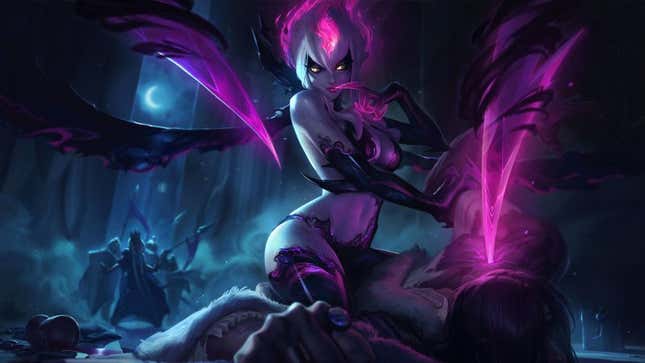
Another former employee says her majority-male division often derided her when she turned down secretarial work, like adjusting the temperature or changing the office’s appearance, despite her non-secretary job. “I feel like that type of working environment caters to men,” she said. “When I went to a stand-up meeting it’d be a lot of men talking over each other. I knew a lot of women were used to being interrupted or not feeling comfortable talking over men. I didn’t feel like I had the ability to talk over them.” she said. Her more introverted nature made her feel like a doormat at Riot, she said, until the day she quit, in 2016.
“People could say whatever they wanted in public to each other even if it wasn’t constructive,” she said. “In meetings, people would say awful things to each other. That idea is terrible, being super aggressive.” When she quit, she said, she was too angry and scared to say goodbye to her colleagues. Now, she won’t drive by Riot’s campus anymore.
Over a dozen women and three men, across different disciplines at Riot, agreed that women were regularly spoken over by louder, male voices. In an e-mail, a Riot representative said Riot does not “value aggressiveness and extroversion as part of our culture.”
In May, 2016, an internal e-mail chain obtained by Kotaku circulated about how to run meetings that are fair to women, introverts and remote workers in a climate that rewards extroversion. Two people employed by Riot at the time described Marc Merrill’s response to the issue of aggression in meetings as alarmingly out-of-touch.
“A label does not excuse people to behave in an ineffective manner,” Merrill said in a reply to the e-mail chain. “All people need to be aware of their own strengths and weaknesses and learn to overcome the latter.” While managers should help everybody participate in meetings, individuals who struggle to fit into Riot’s meeting culture “shouldn’t be surprised” if managers and teams don’t want to work with them, he said. He continued on to say that many introverts at Riot have overcome the tendency to clam up in meetings and not provide feedback, adding, “The thing to guard against is when someone has the expectation that the world will bend to accommodate their unique situation to an unreasonable degree.”
“‘An ineffective manner’” is so loaded,” said Fuller, pushing back on the phrase Merrill used. “What does that mean? Someone who is an extrovert at Riot may think shit is just fine, but an introvert may not be able to push back on that.”
“He’s basically pushing Riot’s extreme ideas of culture fit on everyone and saying if people cannot conform to that, they don’t belong there, because, again, Marc is coming from a place of extreme privilege,” Fuller said. “It’s straight-up discriminatory.”
Another former Rioter agreed, adding, “I think that email meant ‘Riot is a place for only one narrowly defined type of person,’ and that person just happens to be male more often than not.” In an e-mail, a Riot representative said that the company expects all Rioters to “bring self awareness and a growth mindset,” which “will mean stepping out of our comfort zones. . . We all must be committed to collaborating and surfacing the best ideas.”
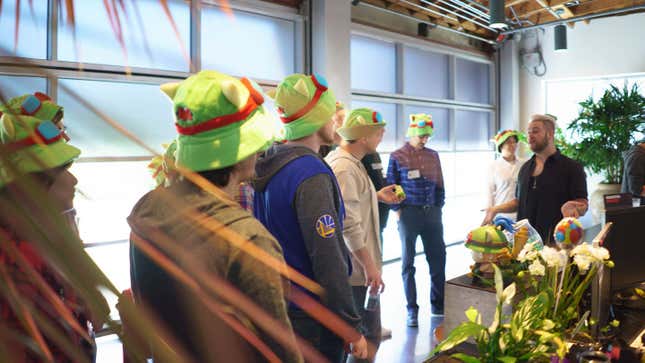
What made this culture of aggression far worse, current and former Riot employees have said, is the apparent double-standard for women. “I’ve seen myself argue endlessly for the value of something, and for that thing to never be taken seriously until a man or a player said it,” said a former employee. Lacy, the former Riot employee who asked her male colleague to pitch the same idea as her during a meeting, agrees that this imbalance is widespread.
One former Riot employee who worked in finance said that she’s been told that her voice is too loud several times. “Are you kidding me? Look at where we work,” she said. “Yeah, I am loud, but not as loud as any of the guys.”
A current Rioter who joined the company in 2016, shortly after the e-mail about meetings went around, said she was excited to finally work somewhere with values that aligned with hers. She described herself as candid, direct, and comfortable in environments with open communication policies, like Riot’s. After nearly three years at the company, however, she said she has not advanced. “When it comes to my growth, development and advancement, the reason why I am not advancing has been explicitly told to me,” she said. “I tend to be very direct. I tend to give open feedback. I tend to challenge other Rioters. Those are Riot’s on-paper values, but the way it translates culturally is that, often, important stakeholders, senior peers or my peers will feel that I am too direct.” She said her manager has told her she’s too emotional.
“It’s more difficult to be a direct female than a direct man,” she said. “I try really hard to be that on-paper Rioter, live up to those values. . . I observe male Rioters acting that way and being pretty successful, promoted to leadership positions, treated as leaders. I don’t see female Rioters able to be leaders in that kind of way.” She added that roughly two-thirds of her performance feedback is not about her work, but her personality.
El-Sabaawi said she’s helping to train leaders at Riot to recognize different personality types in meetings and help empower marginalized groups at Riot, including women. Women in Riot’s senior leadership confirmed that this is a known issue they’re attempting to tackle as well. When I described how sources had told me that Riot’s feedback culture disadvantaged them, El-Sabaawi said, “We are trying to create touchpoints with Rioters about what good feedback looks like. Just because we have an open feedback culture doesn’t just mean you can send someone a lot of super harsh feedback without context.” She added, “I’m super loud even when I’m quiet. . . I’m probably one of the people who needs to shut up a little more.”
If Riot is a company that values feedback, you’d think that its leaders would respond gracefully when women pointed out that this culture can disadvantage women. Yet multiple women told me they felt dismissed when trying to point out sexist issues and incidents. One former Riot employee said that whenever she tried to explain to a colleague why words like “bitch” and “pussy” were gendered insults, or how it can make women feel undermined when men interrupted them during meetings, those colleagues resisted strongly. “Suddenly, the conversation was about why do I choose to interpret things badly and not trust people,” she said.
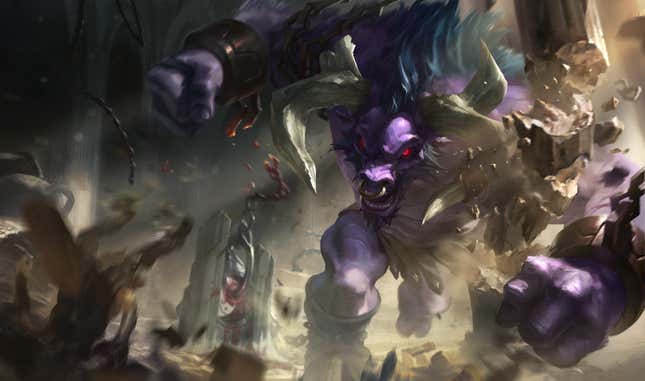
One of Riot’s many mottos is “Default to trust”—in other words, assume that your colleagues always have good intentions. To this woman, that mantra was used as a shield whenever she tried to address sexist habits in the workplace. “If I didn’t trust that they meant well when they did the same thing for the 80th time, it was on me,” she said, “which is a level of gaslighting I’ve never dealt with.” (In an e-mail, a Riot spokesperson emphasized that the company has a “zero tolerance policy” toward harassment, discrimination and retaliation.)
Men at Riot interviewed by Kotaku also said they’d noticed how Riot’s feedback culture wasn’t built to support women. One longtime male Rioter said, “It seems like that culture only applies in ways that are very male-oriented. That style of feedback culture is something that is taken into account when it comes to certain things in work projects but not in gender representation.”
“The company dismisses feedback when it comes to gender,” said another male employee. “Riot is a new upstart company whose explicit mottos are ‘Challenge convention’ and ‘Feedback culture.’ To not see that reflected in the way Riot addresses social issues feels extra bad.”
“The guys who weren’t sexist let the guys who were run the show,” said a third former employee. “Even if they had seniority, they didn’t say, ‘No, fuck that.’”
Meritocracy
Leaders at Riot Games want their company to be a meritocracy, telling employees that advancement is based on merit over everything else. Job listings on Riot’s website promise “seamless, fair, and meritocratic comp review cycles.” But when it comes to promoting women, sources I interviewed say Riot isn’t the meritocracy it advertises itself to be. Promoting employees based on Riot’s core values, sources say, can mean promoting people more likely to fit into the image of the ideal Rioter. That image is skewed toward one demographic. And when one demographic has the lion’s share of power, often, that means stuffing the ranks with allies. Several sources recounted how men were hired into the senior roles they were slated to move into simply because these men were “bored.” Three sources used the word “nepotistic” to describe Riot’s hiring philosophy.
“The ‘bros before hoes’ thing is so ingrained even though they claim to be a meritocracy,” said Jes Negrón, a female former editor on Riot’s editorial team. “People say ‘meritocracy’ there with an undercurrent of sarcasm. Everyone secretly knows that’s not the case.”
It’s difficult to tell, as an observer, whether someone was in fact performing their job well enough to deserve a promotion, and it is impossible to evaluate their leadership skills from afar. It’s similarly difficult to tell whether the men who were promoted over these women were less qualified for the roles. However, we’ve heard similar stories from many of the former Riot employees who spoke to me for this article. They fall into a pattern: A woman performs a manager’s job for a while, without getting a pay raise or title change, only to watch Riot promote an apparently less experienced man over her.
Three months into her time at the company, one former Rioter was feeling frustrated by her manager’s poor performance, she said. She decided to pick up her manager’s slack. (He was later demoted.) Abiding by Riot’s motto, “Stay hungry,” she stepped up to become the team’s de facto leader. She mentored new hires. She led meetings. She updated work processes and led new programs’ rollout. At the same time, she says, she did her own job. She tells Kotaku that a manager said she was slated for the promotion, which a former colleague corroborated. Then, one day, at a party, she says a Riot superior came on to her. When she evaded him, she says, things changed for her at work. Although she was already doing her manager’s job, “a man who probably had three years less experience than me,” ended up getting that promotion. That man was a close friend of the Riot superior who hit on her.
A week after she was told she was an important asset to the team, she said, “I was no longer welcome.” When she sought feedback, nobody could tell her what she did wrong, she says, and those people were similarly in disbelief, which Kotaku corroborated with a former colleague. She was eventually fired, in 2017. “They walked me out like a criminal. They wouldn’t even let me get my bag.” (When asked about this situation, Riot said it would not comment on specific “talent-related cases” but that it was an example of behavior the company “would not tolerate.”)
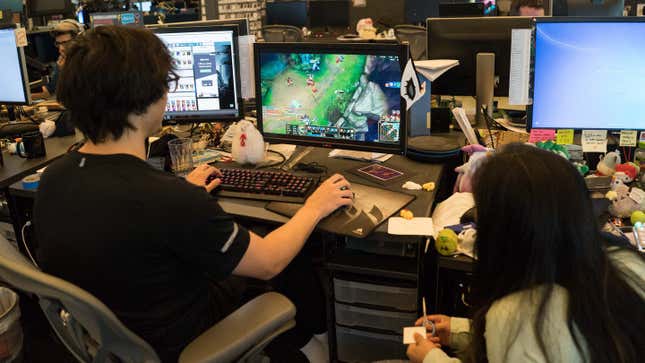
Riot employees are generally encouraged to do work above their pay grade to prove they’re right for a more senior role before receiving that role and compensation for it. Sarah Schutz, Riot’s chief of staff, said, for her, this was beneficial: “I always knew the areas I wanted to work in,” she said. “If you know the kind of change you want to make happen here, you identify the problem and you go change it.” She added, “Nobody’s gonna give you a checklist and tell you how to get to the next level. . . Part of my success is I was growth-oriented, action-oriented and then went to tackle the next thing.”
Other women at Riot say that this approach to career advancement has disadvantaged them. Jes Negrón said that she took on the responsibilities of her boss who left six months into her new job. Nearly a year after that, she felt she deserved the title and pay bump for doing that work. She had been asking her superiors about making the job official, she said. Negrón’s manager gave her open feedback about how successful she was in that role, and a former colleague corroborated to Kotaku that she was being groomed for the position.
Instead, Negrón was never even interviewed for the position, which three different men were given chances to fill. When she asked for feedback on why, she recalls being told that she didn’t do enough to “take” the role, and they wanted to give the man who eventually took it an opportunity to take on more responsibility. “I had to sit in a room of 50 people to announce the other guy was leading the team. It was probably one of the most embarrassing moments in my whole life,” Negrón said. Negrón complained to Riot’s human resources department, but left shortly after the incident, citing how “fed up” she was.
“It was not uncommon,” she told me. “It’s indicative of the fact that Riot claims to be a meritocracy and they hold all these values which, in theory, are excellent but in practice are weaponized with the biases of majority of their population which is men.” Another woman says a man with five years less experience than her in her division—but who had the same title—received a leadership role because he was “bored.” She had been doing work well below her qualifications, like managing calendars, and was incensed he had received this opportunity because, as she tells it, he just wanted to try managing her. “I think they were expecting me to not object,” she said.
One man who worked with Riot’s senior leadership had his own explanation for why women say they have a hard time advancing at the company. “Women are shunned because [men] want to be able to make their gross female jokes,” he said. “They want a group of people they can control.” Letting more women into Riot’s tight circle of senior leadership might make the culture less like a “fraternity,” he theorized.
In one 2016 meeting, Riot leadership held a diversity roundtable in which the lack of women in leadership was brought up, according to two sources present. Several women made their case that they didn’t see leaders at Riot who were like them. A few days later, Riot brought in the Spiral Cats, sexy cosplayers who toured the office in skimpy clothes. “I love cosplay and I’m all about female empowerment, but it felt inappropriate they were there after the diversity town hall,” said one former employee. When asked about this, a Riot representative said the company often brings what it calls “community creators” on campus. The Spiral Cats’ visit, the representative added, was organized in part by a Rioter at the request of both male and female Rioters.
Oksana Kubushyna, the head of platform and most senior woman at the company, explained that Rioters with less access to senior leadership might make assumptions about whether Riot’s promotion practices are fair. Kubushyna has been leading an effort to evaluate her team’s compensation structure, examining employees’ performances in relation to each other. “If two Rioters are doing the same job, they’re evaluated on a similar criteria,” she said. When I asked whether she’s looking at why women might not perform at the same level as men—whether there might be structural issues preventing women from making as much progress at work—she said, “I’m not sure there’s a deliberate effort to look into that.”
To one male employee, Riot’s obsession with being a meritocracy stems from how the company has traditionally misunderstood why some employees might thrive at a huge MOBA-making gaming company while others do not. “It’s easy to think, ‘Oh, all these white men are in power because of merit,’” he said. “That happens a lot at Riot because they’ve convinced themselves it’s a meritocracy. But a meritocracy can’t exist outside of the social setting within merit is constructed. I think that leads to a lot of problems. It’s like an incomplete thought. ‘Surely these people are being promoted because they’re doing well.’ Then they don’t follow up [on] why aren’t these other people getting promoted.”
At tech companies like Riot, the gold rush of ideas and impact draws thousands of hopefuls who want to be a part of something great and make something of themselves in the process. But like gold panners, some Rioters came out with connections, with the best technology, with secret maps, and with the encouragement of others who recognize in them some of themselves. Others—women, primarily—were handed sieves with wide holes. Success escaped. They were no less hardworking, no less talented. But the superstructure benefiting their peers was more difficult for them to become a part of because of the way it was built.
One current Rioter described that superstructure in terms her colleagues know well: tech debt. “If you’re building your technology on not great foundations, you spend a lot of time catching up or trying to fix things,” she told me. Riot is just one company, but two dozen current and former employees have personally experienced or witnessed how its culture and structure—ones shared across the ranks of gaming, infosec, hardware, software, and digital marketplace companies and tech giants—disadvantaged women. The Rioter continued, “I think Riot has grown very fast and not having a planned out organizational structure that encourages diversity has hurt us. We are trying to fix that now. It’s just hard to fix things when they’ve already started. It’s easier to start things the right way and build on that.”

Contact the Special Projects Desk
Reach our team by phone, text, Signal, or WhatsApp at (917) 999-6143, email us at tips@gizmodomedia.com, or contact us securely using SecureDrop.
